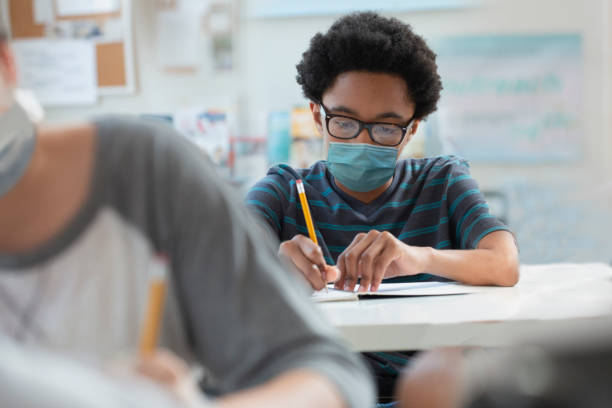
COVID-19 cases and hospitalizations among children are surging across the United States just as students return to school and the highly transmissible Omicron variant begins to dominate the country.
An average of 672 children were being hospitalized every day in the US, as of 2 January, which is double the average of hospitalizations just a week before. The increase in hospitalizations is fueled by the Omicron variant, the holidays, and the pressure on already-strained health systems and schools.
At least nine states have reported record numbers of COVID-related pediatric hospitalizations: They include Connecticut, Georgia, Illinois, Kentucky, Massachusetts, Maine, Missouri, Ohio and Pennsylvania, as well as Washington, D.C.
At Texas Children's Hospital in Houston, pediatric hospitalization numbers have surpassed the peak seen during the Delta surge last summer, Dr. Jim Versalovic, co-leader of the hospital's COVID-19 Command Center, said during a Monday news briefing.
In New York, hospitalizations among kids quadrupled. In Washington DC, children’s hospital admissions have roughly doubled. In Texas, children’s hospitalizations were described as “staggering”. In Alabama, cases were “like a rocket ship”. In Louisiana, one doctor said: “We’ve never seen anything like it.” In Ohio, one associate professor of internal medicine and pediatrics critical care recently told ABC news: “We’re on fire.”
RELATED: Could Omicron ‘End the Pandemic?’
"We have staggering numbers here from this Omicron surge already," Versalovic said during the briefing. "We shattered prior records that were established during the Delta surge in August."
Ninety percent of the hospital's cases were shown through sequencing to have been caused by the Omicron variant.
“We have about four times as many children admitted currently as we have had in any other wave,” Dr. Elaine Cox, the chief medical officer for Riley Children’s Health in Indiana, told reporters on Tuesday.
RELATED: What Do I Do IF…COVID Decision Guide
Cause for concern
While serious illness from COVID is still rare for younger children, the sheer number of new cases worries doctors.
Doctors are seeing the severity rise among the children who are admitted to the hospital, according to Cox. “So there are more of them, and they are sicker.”
"It seems like people have tried to downplay the significance of the disease in children," said Dr. Mark Kline, the physician-in-chief at Children's Hospital New Orleans. "We've spent two years rebutting myths pertaining to COVID and children, that it's 'harmless' for children. It's not."
As of Monday, 14 children were sick enough with COVID-19 to be hospitalized at Kline's facility, with three in intensive care. The three children are under the age of 2. The youngest is just 8 weeks old, Kline said.
More than three-quarters -- 78 percent -- were hospitalized because of COVID complications. About half needed help breathing, and nearly a third were placed in intensive care. A third of the 915 patients had no underlying health problems that would have put them at greater risk for severe COVID infection.
"I think a lot of parents have been relying on the narrative that if you have a healthy child, it's very unlikely that your child can get sick from COVID. That's not true," Dr. Amy Edwards, a pediatric infectious disease expert at University Hospitals Rainbow Babies & Children's Hospital in Cleveland, told NBC News.
"It is true that statistically speaking, your kid probably won't have severe COVID, but statistics don't matter when it's your child who ends up getting sick," she noted.
Edwards adds that she and her colleagues have seen a "significant uptick" in the number of children admitted to the hospital recently with COVID-19, as well as an increase in the number of children needing IV fluids, oxygen support and, in some cases, ventilation.
Doctors say the vast majority of children hospitalized with COVID-19 are unvaccinated, because they are too young to be eligible or their parents declined to get them immunized.
More than 1,000 kids have died in the US from COVID during the pandemic so far, according to data from the Centers for Disease Control and Prevention (CDC). More than 830,000 people have died in the US from COVID so far.
"It's a bit of wishful thinking to say, 'Well, it's mild,' or 'It's going to be OK,' but if there are 10 times as many cases, that still equates with a lot of hospitalizations and a lot of ICU admissions and, unfortunately, deaths," Kline says.
There has also been a sharp uptick in cases among pregnant people and newborns, according to Cox.
Hospitals are also seeing a dangerous wave of RSV (respiratory syncytial virus) and the flu this year, creating a triple threat of respiratory illness, which has caused staff shotages.
“We have significant numbers of our staff who are becoming ill with COVID, so they can’t work,” Cox adds. Indiana is one of the states calling in the national guard to help with hospital care and logistics.
RELATED: FDA Approves Pfizer Booster Shots for Kids Aged 12-15
How school systems are handling rising cases
School systems across the country are also balancing soaring cases, among both students and staff, and weighing virtual options. Leaders of Chicago public schools, the country’s third-largest school network, canceled classes Wednesday after the teachers union voted to switch to remote learning due to the surge in COVID cases.
In late December, President Joe Biden urged the widespread use of tools to combat the virus. This includes tests and vaccines. “We can keep our K-through-12 schools open, and that’s exactly what we should be doing,” he said.
In Washington DC, which has some of the highest rates of COVID in the country, all students and staff are now required to take a rapid test before returning to school – one of the few districts in the country with this requirement.
However, testing has been difficult to find in many places. In fact, the neighboring Montgomery county, Maryland, are recommending, not requiring, tests for students and staff despite being hit hard by hospitalizations.
“We have tools now that we didn’t have last year, that will allow us to keep schools open if we deploy those tools in the best possible way,” says Brian Castrucci, who is the president and CEO of the de Beaumont Foundation, a former state and local health official, and the parent to school-aged kids in Montgomery county.
“We’re dealing with trying to make sure that schools are operational, that there are enough bus drivers, there are enough teachers,” Castrucci adds.
However, educators and health officials are worried that a return to school during a time of unprecedented spread could lead to the involuntary closure of schools due to staff shortages and contribute to rising cases, especially in places that aren’t able or willing to institute precautions.
“It is mind-boggling some states have a [mask] mandate ban, or do not do enough to keep our kids safe,” notes Tony Yang, executive director of the Center for Health Policy and Media Engagement at George Washington University, who has researched mask mandates in schools.
Yang strongly favors in-person school with precautions in place. “Students should go to school in person,” he said. “But you have to do that safely.”
Castrucci suggests putting some precautions in place where cases are particularly high. Schools could choose to extend winter break to avoid staff shortages during the worst of the January peak.
“The number one thing is, we have to use every resource we have to keep kids in school in person over the long term,” he says. “And right now, we have to make a risk calculation as to whether this is the right moment to bring kids back from the holiday.”
RELATED: CDC Backs Boosters for High-Risk Kids Aged 5-11, Shorter Time Between Shots
The importance of vaccinations
Vaccines are another key tool, says Diego Hijano, a pediatric infectious disease doctor at St Jude Children’s Research hospital in Memphis, Tennessee.
“Vaccination matters in terms of hospitalization and outcomes,” he shares. Most of the hospitalized kids around the country are unvaccinated, and Hijano hasn’t seen a vaccinated child hospitalized for COVID– despite working with many children who are at risk because of other medical conditions.
Hijano says hospitals that are overwhelmed by COVID can lead to worse care and outcomes for children suffering from other causes.
“If a kid has appendicitis and needs a bed for the surgery, they may not get it because the hospital is flooded with COVID,” Hijano adds.
“As a country and society, we shouldn’t allow even one death that could be prevented,” he concludes.






